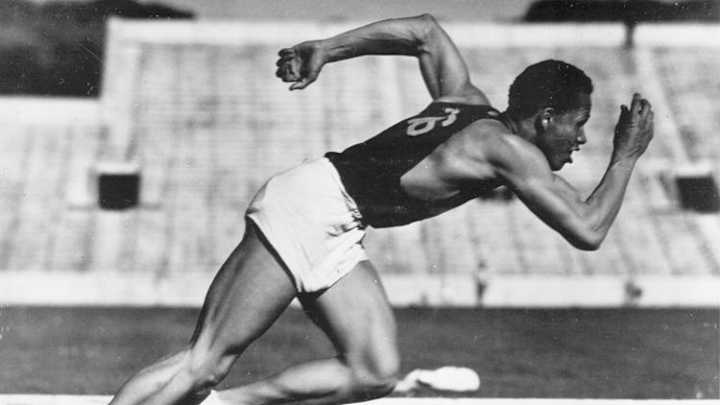Sir Francis Drake High Renamed in Honor of Former Cal Olympic Champ Archie Williams

The late Archie Williams, who won a gold medal in the 400-meter dash at the 1936 Berlin Olympics, has received an honor equally rare and distinguished.
Sir Francis Drake High School in San Anselmo has been renamed Archie Williams High School, honoring a Cal graduate who made history at Hitler’s Olympics then spent 21 years teaching math and computing at the Marin County high school.
“Archie Williams is inarguably an individual who made tremendous contributions to our school, our community and to our nation,” said Leslie Harlander, president of the Tamapais Union High School District, after the change was made official last week.
Williams, who grew up on the Oakland-Berkeley border with a view of the Campanile from his front yard, graduated from Cal with a degree in mechanical engineering. He served as a Black flight instructor for the Tuskegee Airmen then worked for the military as a meteorologist.
During more than two decades as a teacher at Drake, Williams was regarded by students for being kind, respectful and modest, according to the Marin Independent-Journal.
Williams died in 1993 at the age of 78.
“Archie Williams’ contributions and character align beautifully with the student body’s values,” said Principal Liz Seabury, adding that she hopes the change recognizes “community, equity, positivity and service to others. That’s what Archie Williams’ remarkable legacy says to us.”
The name change was prompted during a year of debate over racial injustice, triggered by the killing of George Floyd. Sir Francis Drake, a 16th-century English seaman and explorer, also has a legacy as a slave trader and pirate.
The district’s decision to change the school’s name generated controversy in the community because of what detractors considered a flawed process and cancel-culture claims.
But few if any objected to Archie Williams being honored. His family gave its approval to the board and the decision was applauded by many.
“My father was all about the values of unity, integrity, passion, hard work and loving others more than you love yourself,” said Carlos Williams, a Sausalito resident and Archie Williams’ son. “Our entire family is truly honored by this. We’re ready to keep his legacy alive.”
Noah Griffin, a Tiburon writer and social activist, called Williams “one of those silent, unsung heroes.” Speaking to the Marin I-J, he said, “I’m just delighted with the choice. It has so much contemporaneous relevance to our times.”
Williams’ rise to Olympic glory was unexpected. He wasn’t a serious runner for most of his youth, and arrived at Cal from junior college not expecting to be part of the track program.
“I was a nobody,” he was quoted saying years later. “Nobody recruited me…and I didn’t care because I was going to play in the physics lab.”
Legendary Cal coach Brutus Hamilton convinced Williams to join the team, perhaps envisioning potential that even Williams couldn’t see.
Williams had never broken 49 seconds for the 440-yard dash until 1936, when he set a world record of 46.1 for 400 meters on his way to winning the 440 at the NCAA Championships.
In the Olympic final at Berlin, he is credited with winning in 46.5 seconds, with a significant margin of 0.2 seconds over runner-up Arthur Godfrey Brown of Great Britain. But a photo finish of the race suggests a more reliable margin of just 0.02 seconds.
Years later, in a 1992 interview conducted by the Bancroft Library for The University of California Black Alumni Series, Williams recalled the surprise he felt with just being at the Olympics.
“I was happy. It was like a dream. You were dreaming you were in something that you thought about before,” he said. “What am I doing here? Is this me? In fact, when it was over and I came back, did that really happen? Did I really do that? That kind of stuff. I think most people feel that same way, especially because . . . one year I was nothing, the next year I was in this.”
At the Games, Williams joined fellow African American track star Jesse Owens among those with whom Hitler refused to shake hands. But Williams, who had experienced discrimination at home, said citizens in Germany was smitten with Owens after his four-gold performance.
“I think they wanted to see if the black would come off if they rubbed our skin,” Williams said. “Jesse Owens might have been snubbed by Hitler, but he was a hero in the eyes of the Germans. They followed him around the streets like he was the Pied Piper.”
Williams also famously was quoted by the Oakland Tribune in 1981, talking about the difference in the way he was received in Germany vs. at home.
“As I recall, when I came back home . . . people asked me, ‘How did those dirty Nazis treat you?’ To which I always replied, ‘Well, over there at least we didn’t have to ride in the back of the bus.’ “
Officials for the newly named Archie Williams High say they hope to have campus signage and team uniforms changed in time for the start of the 2021-22 school year.
Chuck Ford, a former district trustee, told the Marin I-J it will be important to make sure current students are familiar with Williams’ story. He also said the recognition should have come sooner.
“Almost from the week that Archie passed away, I thought a school should be named after him.”
Cover photo of Archie Williams courtesy of Cal Athletics
Follow Jeff Faraudo of Cal Sports Report on Twitter: @jefffaraudo

Jeff Faraudo was a sports writer for Bay Area daily newspapers since he was 17 years old, and was the Oakland Tribune's Cal beat writer for 24 years. He covered eight Final Fours, four NBA Finals and four Summer Olympics.